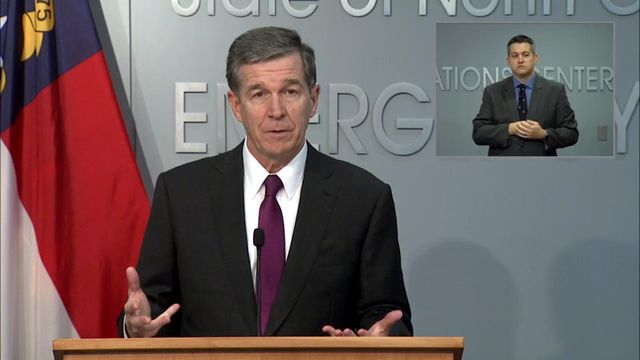Cooper expects to remove capacity limits, end distancing requirements in June
Gov. Roy Cooper announced Wednesday that most pandemic-related restrictions in North Carolina will likely be lifted on June 1, including capacity limits on businesses and distancing requirements.
Posted — UpdatedThe move comes with a big caveat, however: People need to keep getting vaccinated, and the numbers of new infections and hospitalizations must not spike.
The statewide mask mandate also might be adjusted, depending on how key metrics look in late May, Cooper said.
"Although we're making progress, we haven't beaten COVID-19 yet, and the virus will still be with us, even after June 1, so we need to keep being responsible," he said during an afternoon news conference.
The state has averaged 1,964 new infections a day over the last week. That's down from a peak of nearly 8,800 cases a days in early January but still higher than the daily case count of about 1,200 last September when the virus ebbed after a summer surge.
Meanwhile, the state has seen 22 COVID-19 deaths a day in the period, which is the highest rate since last month. Also, the 7 percent rate of positive virus tests remains above the state's 5 percent target.
The governor set a goal of getting at least one dose of vaccine in two-thirds of adults in North Carolina in order to lift the restrictions. To date, about 47 percent of adults statewide – 77 percent of senior citizens – have had their first dose of a two-shot regimen, according to Department of Health and Human Services statistics.
Nearly 36 percent of North Carolina adults are fully vaccinated, including 71 percent of seniors. That outpaces the national rate of less than 34 percent.
"Vaccines are the key to us moving forward, to strengthening our economy, to making sure our children are on track for school now and in the fall, to hugging our loved ones safely and to saving lives," Cooper said. "Each shot in an arm is step closer to putting this pandemic in the rear-view mirror."
To boost vaccinations, North Carolina will roll out the "Bring Back Summer" campaign during two weeks in May and another two weeks in June, when organizations will rally together to promote people getting shots, DHHS Secretary Dr. Mandy Cohen said.
Mass gathering limits, which also could end in June, were similarly eased last month, going from 25 to 50 people indoors and 50 to 100 people outdoors.
Cooper said the mask mandate will remain in place through May, and he plans to sign an executive order next week laying out "exactly what kind of mask mandate that is," as well as spelling out other restrictions that will be in place in May.
After June 1, he said, he hopes that masks will be required only in public places indoors, and that the mandate might be lifted entirely once North Carolina passes the two-thirds of adults vaccinated target.
"For now, keep wearing your mask in public so we keep our trends where we want them," Cohen said.
Cooper and Cohen both said reaching that vaccination goal will be difficult, noting access among some communities has been a problem, as has extensive reluctance toward shots among large swaths of state residents.
"We are going to pull out all of the stops to make sure we're doing everything possible to make sure it is easy for anyone to get a vaccine," Cohen said. "Then it becomes really about North Carolinians literally rolling up their sleeves and doing their part."
Related Topics
• Credits
Copyright 2024 by Capitol Broadcasting Company. All rights reserved. This material may not be published, broadcast, rewritten or redistributed.






